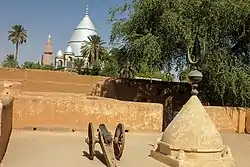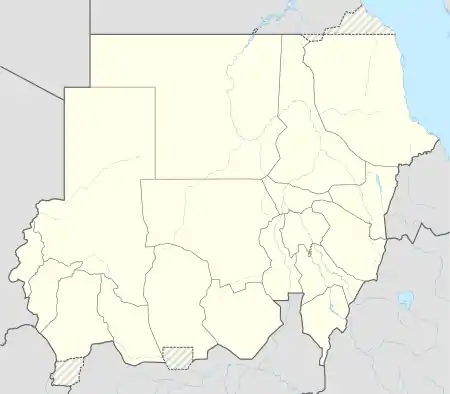Khalifa House Museum
The Khalifa House Museum is an ethnographic museum, located opposite the Mahdi’s tomb in the city of Omdurman in Sudan.[1] It was the residence of the successor of the Mahdi, Khalifa Abdallahi ibn Muhammad and the headquarters of the administration of the Mahdi State. The House was converted into a museum in 1928.
 In the foreground: Cupula of the original Mahdi's Tomb. In the background: The new Mahdi's Tomb. | |
 Situation of the Khalifa House Museum | |
| Established | 1928 |
|---|---|
| Location | Omdurman, |
| Coordinates | 15.383°N 32.290°E |
| Type | Ethnographical collection covering the Mahdiyah rule |
The house

The Khalifa House is a low, two-storied building with a series of linked courtyards. The ground floor was built in 1888 and the upper floor in 1891. Its traditional mud-brick structure is of great historical importance, since it exhibits the style and architecture prevailing at the period.
The museum
The Khalifa House Museum contains artefacts relating to the Mahdiyah rule during the last two decades of the nineteenth century such as suits of mail,[2] Mahdist coins, flimsy banknotes issued by Gordon during the Siege of Khartoum, swords and personal belongings of the Khalifa. Some rooms are dedicated to the Battle of Omdurman showcasing rifles, banners, spears and robes obtained from the battle field. The collection also includes photos of Khartoum during this time and its subsequent occupation by the British.
The courtyards house several interesting items such as the cupola saved from the ruins of the original Mahdi's tomb and also the first car in Sudan, an Arrol-Johnston motor tractor.
Restoration
The Khalifa House Museum was awarded funding in 2018 by the British Council for the Western Sudan Community Museums Project. During the two-year funding period, the building and its extensive collection was restored. Staff were given training in material conservation, collection management, storage and protection of the displays.[3] The collections were photographed and digitised, and this data was shared with another British Council Cultural Protection Funded project, Sudan Memory.
References
- Official information board hanging on the Khalifa House
- The making of mail at Omdurman, in: Kush. Journal of the Sudan Antiquities Service, vol.IV 1956 pp.83-84
- CHRC Cambridge Heritage Research Centre Bulletin. University of Cambridge. Retrieved December 21, 2020.